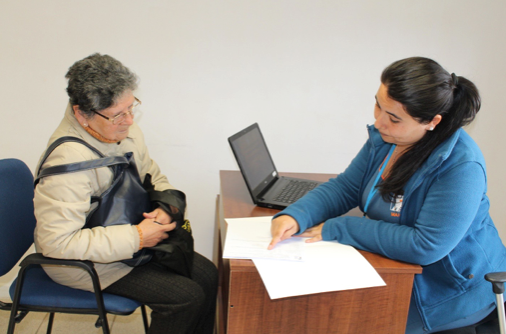Two research esought to contribute to chile's decline in Alzheimer's

An investigation that will last 10 years in an area of high prevalence of this disease, and another about a drug made from a medicinal plant, open new horizons to counter act and lower its complex statistics in the country.
"I see the words hanging in front of me and I can't understand them, I don't know who I am and I don't know what's going to be the next thing I lose" corresponds to a fragment of the film Always Alice, where a woman begins to feel disoriented and forgetful, and who is diagnosed with Alzheimer's.
According to Dr.. Pedro Cisternas, associate researcher at the Center for Aging and Regeneration of the Pontifical Catholic University, "Alzheimer's is a neurodegenerative disease that causes a progressive failure of all brain functions. It has a high prevalence, mainly in adults over 65 years of age". The same expert comments that "one of the first manifestations of this disease is the short-term memory loss that is associated with processes of daily life, leading to a significant loss in the quality of life of the patient and related persons".
There are a number of factors that are associated with aging and that could be applied in the prevention of Alzheimer's disease, how are mental activity, exercise and diet, among others.
The incidence of Alzheimer's increases with age and accounts for 60 to 70% of dementia cases, According to the World Health Organization (WHO). Today, our country has a life expectancy of 77 years for men and 82 years for women. Census data indicate that our population is aging: in 1992, a 6,6% of people were over 65 years old, while in 2017 this figure increased to 11,4%. According to data from the Ministry of Health, 200 thousand people have dementia.
Faced with this reality, a series of policies are being developed to prevent and generate protective factors related to the health and social aspects of these patients.. One of them is that, from July this year, Alzheimer's has been incorporated into the Explicit Health Guarantees Plan, BOOM, including its diagnosis and treatment.
How to Prevent Alzheimer's Disease
There are a number of factors that are associated with aging and that could be applied in the prevention of Alzheimer's disease, how are mental activity, exercise and diet, among others.
In this respect, Dr. Pablo Toro, psychiatrist at the Pontificia Universidad Católica de Chile, associate researcher at the FONDAP Center of Conicyt ACCDiS – Advanced Center for Chronic Diseases – notes that "one of the most relevant factors in Alzheimer's disease is the educational level. It is so important that the term Cognitive Reserve has been coined, which is the brain's ability to compensate for the deterioration caused by processes like aging. People who maintain permanent mental activity generate greater neural connections than those that do not, which ultimately leads to the death of neurons irreversibly", Said.
An unbalanced diet and lack of exercise are not only associated with diseases such as diabetes mellitus, metabolic syndrome, dyslipidemia, high blood pressure and obesity, but they are also related to the development of Alzheimer's disease, adds the doctor. "There are diets that improve cognitive reserve, like the Mediterranean diet", adds Toro. This diet consists mainly of vegetables, legumes, fruits, cereals, a high to moderate intake of fish, a low intake of dairy products and red meat, and a regular but moderate intake of red wine.
On the other hand, physical activity improves brain irrigation and facilitates connectivity between neurons, reducing their loss and preserving volume in vulnerable brain regions. According to a meta-analysis published in the journal Journals of Gerontology: Biological Sciences the year 2017, the window of opportunity for the beneficial effect of physical activity is quite wide and can be extended even for those who decide to start doing it later in life..
Application of Cognitive Function Survey in MAUCO Cohort
Alzheimer's Research in Chile
Dr. Pablo Toro is currently participating in the first population cohort study in our country in the city of Molina in the Maule region (MAUCO) of the ACCDiS, place with high mortality rates from diabetes, Diseases Cardiovascular, pneumonia and Alzheimer's disease.
About the study, says that, in the cohort, the objective is to evaluate the common environmental factors to which the population is exposed and that lead to the development of these pathologies. This will be analyzed over the next 10 years of the study.. "We are conducting a series of evaluations through tests., questionnaires – among others – to measure attention, memory, Language, and activities of daily living that will allow to obtain results of cognitive function", indicates. He adds that this study is of great relevance especially to obtain data closer to the reality of our Chilean population, even though it is carried out in a particular region.
Dr. Pedro Cisternas, is another researcher who is studying this disease. "In recent years our laboratory has been looking for molecules that delay the appearance of the first manifestations of Alzheimer's disease or that allow brain functions to be recovered in models where the disease is already established", explains the academic.
Dr. Pedro Cisternas is another researcher who is studying this disease. "In recent years our laboratory has been looking for molecules that delay the appearance of the first manifestations of Alzheimer's disease or that allow brain functions to be recovered in models where the disease is already established", explains the academic.
"We have demonstrated the importance of a cell signaling pathway and the importance of glucose metabolism in Alzheimer's disease.. In this context we have used the molecule Andrographolide (ANDRO)”, designates, explaining also that "ANDRO is the main active component of the medicinal plant Andrographis paniculate".
Explains Dr. Tanks that have been tested on models for this component in vitro (mouse hippocampal neuron cultures) e in vivo (transgenic mice to manifest some characteristics of Alzheimer's diseases). "In both models we studied the effect of ANDRO on neuronal activity and whether these effects correlate with a better in the animals' memory and/or a change in markers of Alzheimer's disease., and we have shown that this molecule is able to improve different functions of the brain, such as the generation of new neurons, communication between neurons and enhance the use of glucose at the brain level".
As a whole, the researcher comments that these functions support the idea that this molecule may represent an interesting pharmacological tool against Alzheimer's disease.. Regarding the possible use of this molecule in patients, he believes that "more studies are needed to rule out unwanted effects due to chronic consumption of this molecule.. In addition, it is necessary to clarify the dose necessary for this molecule to efficiently reach the brain".
Dr. Cisternas reflects on the importance of research in this area. "The development of knowledge to understand these diseases is essential to subsequently develop pharmacological therapies to prevent the onset of the disease and thereby improve the quality of life of patients and their families", indicates, by way of conclusion.
See note complete: COUPLE explores North RM


